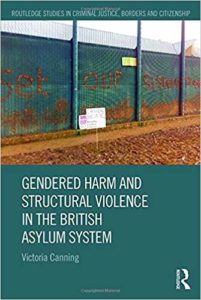Book Review: ‘Gendered Harm and Structural Violence in the British Asylum System’ – Dr. Vicky Canning
Dr. Victoria Canning is a Senior Lecturer at the University of Bristol in the United Kingdom (UK) who specialises in examining the intersection of gender and displacement. Her book ‘Gendered Harm and Structural Violence in the British Asylum System‘ offers an in-depth exploration of how the British asylum system contributes to the re-traumatisation of women escaping persecution – a topic that continues to receive limited focus in media, policy, and academic circles. By drawing upon Johan Galtung’s pioneering conceptualisations of structural violence in Violence, Peace and Peace Research, Canning’s book discusses the complexities inherent in Britain’s policies for managing asylum seekers.
Canning highlights how structures of deterrence and securitisation have unique and complex consequences for women.
In Canning’s view, the everyday impact of macro-level political decision-making aligns with Galtung’s definition of structural violence as Britain’s asylum policies exacerbate the social, emotional, and physical trauma experienced by women seeking asylum in the UK. In doing so, Canning highlights how structures of deterrence and securitisation have unique and complex consequences for women. For instance, Canning highlights the degree with which asylum seeking women disproportionately experience sexual violence and abuse compared with their male counterparts, paying careful attention to how these women are re-traumatised through more subtle and implicit forms of abuse upon seeking asylum in the UK.

Book Cover: ‘Gendered Harm and Structural Violence in the British Asylum System’ – Dr Vicky Canning.
Canning’s work, which won her the 2018 British Society of Criminology Book Prize, is informed by several years of volunteer, research and advocacy work with women from asylum seeking backgrounds in the UK, whose stories shed light on the diverse ways in which seeking asylum affects women. In particular, Canning tells the story of Hawwi, whose experiences within Britain’s asylum system offer a prime example of the continuum of violence that form the basis of the book.
Hawwi not only grew up in a nation affected by poverty and ongoing conflict, but she also experienced family violence, and was subjected to physical abuse for her work as a journalist. Upon fleeing, she was sexually assaulted by a people smuggler, which led to her contracting HIV. After arriving in the UK and applying for refugee status, Hawwi experienced lengthy wait-times, was subjected to repeated misinformation, and the Home Office initially rejected her asylum claim. Hawwi’s story enabled Canning to deftly point out how women seeking asylum in Britain often experience a continuum of violence and abuse that intersect with the kinds of structural processes that result in their further exclusion and deprivation of basic human rights and dignity.
Themes of everyday violence are explored in this book through careful consideration of the manner with which such violence is exacerbated for women seeking asylum. For example, Canning discussed the role of the Home Office regarding its response to criticism deriving from the organisation’s immigration detention policies. One potential limitation here is that the views and experiences of the Home Office’s caseworkers were not included. As they arguably serve at the ‘front line’ of asylum applications, Home Office staff may have offered important and significant insight into the cultural and structural mechanisms with which asylum claims are managed, especially when considered alongside the highly valuable perspectives of asylum seeking women documented in the book.
Women seeking asylum in Britain often experience a continuum of violence and abuse that intersect with the kinds of structural processes that result in their further exclusion and deprivation of basic human rights.
Overall, this book provides a pivotal and timely critique of Britain’s policy response to asylum seekers, thoughtfully highlighting the resultant trauma, dehumanisation, and exclusion faced by women navigating the country’s asylum system. By positioning her discussion through Galtung’s structural violence lens, Canning has offered a highly nuanced analysis of the various institutional harms caused by Britain’s response to people seeking asylum.
